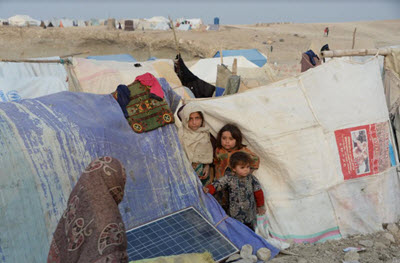VIENNA, November 16, 2020 – Afghanistan was once a hot topic during the U.S. presidential debates since its military intervention in 2001. Currently, it seems that this topic has lost its significance and neither president Donald Trump nor his rival, newly elected U.S. president Joe Biden mentioned Afghanistan in their presidential debates, a country the U.S. once invaded to ensure peace and stability. The Afghan war has been ‘unwinnable’ for all U.S. presidents since George W. Bush started the war in 2001.
In April 2020, in an article entitled, “Why America must lead again: Rescuing U.S. Foreign Policy after Trump” in the Foreign Affairs magazine, Joe Biden promised that he would bring most of the U.S. troops back home. He believes that the endless war in Afghanistan and the Middle East cost America a fortune and most importantly a number of lives.
“We should bring the vast majority of our troops home from the wars in Afghanistan and the Middle East and narrowly define our mission as defeating Al-Qaeda and the Islamic State,” wrote Biden. He emphasized that the U.S. must maintain their focus on counter-terrorism.
Now that the U.S. elections are over, the U.S. President-Elect Biden will inherit the war in a country that has never been so fragile and insecure as it is now especially in the past 19 years. The Taliban is on the doorsteps of major cities including the capital, Kabul. The Afghan civilians have been killed by all sides in the conflict despite the peace agreement that the U.S. administration and the Taliban negotiators signed on the 29th of February in Doha, Qatar.
Atta Noor, 46, a university lecturer in Kabul does not expect any major changes in the U.S. policy towards his country. “While the U.S. election results may have a considerable impact on world politics, it will not bring an enormous change to the U.S. policies towards Afghanistan.” Noor also said that Afghans were tired of the daily loss of lives as much as the U.S. public is tired of his country’s unwinnable war.
The ongoing peace talks in Doha and the spread of Covid-19 has not prevented the loss of innocent lives. The UN Assistance Mission in Afghanistan (UNAMA) documented 5,939 civilian casualties (2,117 killed and 3,822 injured) between the 1st of January to the 30th of September 2020. According to the UNAMA report, the Taliban are responsible for 45% of these deaths and injuries, the Afghan government security forces for 23% and the rest is attributed to international military troops that include NATO forces and various international terror groups such as ISIL-KP.
Based on the Doha peace agreement, the US will pull out their troops from Afghanistan within 14 months after the truce was signed early this year in exchange for Taliban’s commitment not to allow Al-Qaeda or other Pakistani-based terror groups to use Afghanistan’s soil against U.S. interests. On the 8th October, Trump tweeted that all remaining U.S. troops should be withdrawn from Afghanistan by Christmas.
On October 24th, the Afghan government said that its intelligence identified and killed Abu Muhsin Al-Masri in the eastern Ghazni province. He was a close aid to the Al-Qaeda leader and had supported the Taliban and notorious Haqqani network for years. The killing of a top Al-Qaeda operative in a Taliban-controlled territory in Afghanistan is a clear indication of close ties between the Taliban and Al-Qaeda.
The Taliban issued a statement asking the President-Elect Joe Biden on the 10th of November to stick to the Doha agreement because the group views it as a “powerful basis for solving the Afghan issue”. The Taliban, in their statement stressed that the withdrawal of “all U.S. forces from Afghanistan and not allowing the use of Afghanistan to threaten America” is in the interest of both the U.S. and Afghanistan.
“The Islamic Emirate would like to stress to the new American President-Elect and future administration that the implementation of the agreement is the most reasonable and effective tool for ending the conflict between both our countries,” stated the Taliban.
“I think the withdrawal is imminent. That will mean a win for the Taliban, the triumphant militants will not accept a deal, even if it is a peace deal with the current government,” Noor said.
On the 12th of September, the Afghan government delegation and the Taliban negotiators kicked off their first face-to-face meeting in Doha termed as ‘intra-Afghan talks’ hoping to resolve their grievances, but with two months gone by, the negotiations have not had any progress.
The university lecturer, Atta Noor believes that both sides of the negotiations have killed time to see what the new U.S. administration will do next year. “We don’t have an ongoing peace process now because the two sides have not begun talking about peace yet. The Doha meeting now seems to be just a wait and kill-time process. Both the Taliban and the Afghan government are eagerly waiting to see the next move of the U.S. administration.”
The Head of Afghanistan’s Cultural Association in Austria – AKIS, Ghoussudin Mir, is worried that President-Elect Biden will engage Pakistan as a key player in Afghanistan’s peace process. He said that if the U.S. gave more power to Pakistan especially through the Taliban in the Afghanistan peace talks, that will be the beginning of a different kind of war and on a much larger scale.
“If Pakistan gets more involved especially through its proxies like Taliban and ISIL-KP, the war will continue and it will intensify. Pakistan has been sending terrorists to Afghanistan for the last 40 years and this time this will lead to a war between the two countries,” said Mir.
“I am afraid that Pakistan’s military and intelligence are trying to expand their rule into Afghanistan. Afghanistan has the most dishonest neighbor in Pakistan. The President-Elect Biden should engage Afghans, not Pakistan if he is serious about Afghan peace,” concluded Mir in a telephonic interview from Vienna.
_________________________________________
Written by Ali Ahmad/Vienna
Photo credit: @Norullah
Editor Note: The contents of the article are of sole responsibility of the author. Diplomatic Aspects will not be responsible for any inaccurate or incorrect statement in the articles.




